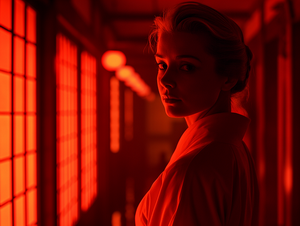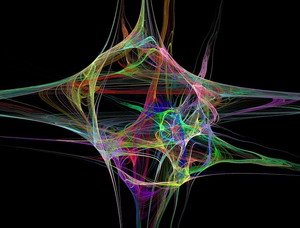Do you ever get that feeling that the room is spinning? You are not sure which way is up. You don’t know if your fee  t are where they should be. Everything is just moving around. Closing your eyes may help, but sometimes it only makes things worse. Generally, we call this vertigo. Personally, I would rather have pain than vertigo, but that is just me. This dizziness may cause nausea and it may cause headaches. Many different muscles may even begin to cramp as your body struggles to right its position and regain balance. Vertigo is not much fun.
Twenty years ago I would see maybe one case of vertigo every month or two. Currently, I am hearing two or three p atients complaining of vertigo each day! Something is going on. Why is there such a huge increase in dizziness? Yes, I know it is an election year, but this trend has been going on since Covid first hit. The correlation to the appearance of Covid naturally leads me to suspect that this may be involved. How could that be? Most of us have heard that vertigo is caused by the tiny stones (otoliths) in our inner ear getting out of place. There are several positional corrections for this which I will discuss later, but truthfully, this is only the cause in a small percentage of the cases of vertigo. There are a whole host of other possible causes for vertigo that no one ever talks about. atients complaining of vertigo each day! Something is going on. Why is there such a huge increase in dizziness? Yes, I know it is an election year, but this trend has been going on since Covid first hit. The correlation to the appearance of Covid naturally leads me to suspect that this may be involved. How could that be? Most of us have heard that vertigo is caused by the tiny stones (otoliths) in our inner ear getting out of place. There are several positional corrections for this which I will discuss later, but truthfully, this is only the cause in a small percentage of the cases of vertigo. There are a whole host of other possible causes for vertigo that no one ever talks about.
Generally, the causes of vertigo are grouped into two categories – central and peripheral. Central causes relate to issues within the brain itself while peripheral causes are outside the brain,
 such as the ears, eyes, or the balance nerves to the joints. Frustratingly, as is often seen with aging, there can be several contributing causes at once all adding together to produce the vertigo dizzies. Vertigo includes all sorts of balance loss issues, not just feeling like the world is moving around. Often it is accompanied by hearing loss or tinnitus and sometimes nausea bad enough to trigger vomiting. Around 10% of people will experience vertigo at some point in their life with about 5% of folks having vertigo in a given year. such as the ears, eyes, or the balance nerves to the joints. Frustratingly, as is often seen with aging, there can be several contributing causes at once all adding together to produce the vertigo dizzies. Vertigo includes all sorts of balance loss issues, not just feeling like the world is moving around. Often it is accompanied by hearing loss or tinnitus and sometimes nausea bad enough to trigger vomiting. Around 10% of people will experience vertigo at some point in their life with about 5% of folks having vertigo in a given year.
Central brain-based vertigo usually is more about bal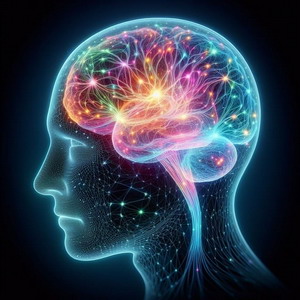 ance loss and less about dizziness. Lesions in the brainstem or cerebellum from strokes and tumors are typically a cause of balance loss. Various brain diseases like epilepsy, MS, and Parkinson’s can be a cause. Interestingly, cervical spine issues like degeneration of the joints as well as compression and malposition of the joints can trigger central vertigo. This is why Chiropractic can directly help some cases of vertigo. Many times vertigo is associated with migraine headaches. Various chemicals and drugs will also trigger vertigo. A real obvious one is alcohol creating problems with balance. Hence the coordination tests when you are pulled over for erratic driving. Here is one to be aware of – aspirin can cause vertigo in sensitive people, as can carbon monoxide (e.g. auto exhaust.) Now for the big ah-ha. Viral infections that get to the brain can cause vertigo – the probable reason for the big increase in patients reporting vertigo over the last few years. With all the problems we are seeing with long Covid, you would not need to have an active infection to still experience vertigo from Covid. Here is a question that has not been answered. Is long Covid a stealth pathogen of Covid viruses hiding in the system, or an immune overreaction to the Covid proteins? If it is the latter then the Covid proteins (spike proteins) in vaccinations could also be a cause for vertigo. Scientists are still investigating the whole long Covid issue. ance loss and less about dizziness. Lesions in the brainstem or cerebellum from strokes and tumors are typically a cause of balance loss. Various brain diseases like epilepsy, MS, and Parkinson’s can be a cause. Interestingly, cervical spine issues like degeneration of the joints as well as compression and malposition of the joints can trigger central vertigo. This is why Chiropractic can directly help some cases of vertigo. Many times vertigo is associated with migraine headaches. Various chemicals and drugs will also trigger vertigo. A real obvious one is alcohol creating problems with balance. Hence the coordination tests when you are pulled over for erratic driving. Here is one to be aware of – aspirin can cause vertigo in sensitive people, as can carbon monoxide (e.g. auto exhaust.) Now for the big ah-ha. Viral infections that get to the brain can cause vertigo – the probable reason for the big increase in patients reporting vertigo over the last few years. With all the problems we are seeing with long Covid, you would not need to have an active infection to still experience vertigo from Covid. Here is a question that has not been answered. Is long Covid a stealth pathogen of Covid viruses hiding in the system, or an immune overreaction to the Covid proteins? If it is the latter then the Covid proteins (spike proteins) in vaccinations could also be a cause for vertigo. Scientists are still investigating the whole long Covid issue.
Peripheral vertigo is concerned with greater issues of movement perception. This is classified as either objective or subjective. Objective is the perception that things in your environ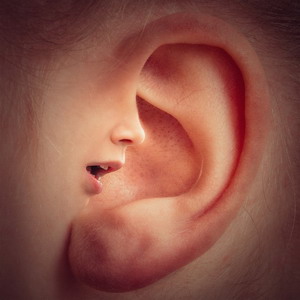 ment are moving while subjective is the feeling that you are moving. Peripheral vertigo generally involves the vestibular balance system in the inner ear. The most common form of this is called benign paroxysmal positional vertigo (BPPV) and it accounts for about 32% of all peripheral vertigo. This is the kind where there is nothing dangerous going on, it comes on for no reason, it comes and goes, and various body positions seem to set it off. This is the type most typically associated with the stuck or displaced little stones in the semi-circular canals of your inner ear. These canals contain fluid that sloshes around when you move your head triggering tiny hair cells to record which direction your head has moved. If these signals are mismatched right to left or in any other plane of movement then the brain gets confused and thinks either the world has gone topsy-turvy or you have. That is why one of those little stones knocking around where it does not belong is such a problem. ment are moving while subjective is the feeling that you are moving. Peripheral vertigo generally involves the vestibular balance system in the inner ear. The most common form of this is called benign paroxysmal positional vertigo (BPPV) and it accounts for about 32% of all peripheral vertigo. This is the kind where there is nothing dangerous going on, it comes on for no reason, it comes and goes, and various body positions seem to set it off. This is the type most typically associated with the stuck or displaced little stones in the semi-circular canals of your inner ear. These canals contain fluid that sloshes around when you move your head triggering tiny hair cells to record which direction your head has moved. If these signals are mismatched right to left or in any other plane of movement then the brain gets confused and thinks either the world has gone topsy-turvy or you have. That is why one of those little stones knocking around where it does not belong is such a problem.
Other triggers for peripheral vertigo include Ménière’s  disease, vestibular neuritis, simple colds and flu bugs, and direct insults like a skull fracture. Ear infections are also good triggers as well as various chemical insults from certain drugs. At this point, you should have the bigger picture that there are a lot of things that can trigger vertigo. There is not a lot you can do with some of those causes, like the consequences of a stroke. My sweetie, Ellen, has this issue. Her stroke was in the balance centers of her brain. Those brain cells are just gone now. We work every day to recruit alternate brain pathways to compensate for this big hole in her brain, but they are not responsive. But, we keep trying. Other causes have very simple remedies, like not drinking alcohol, not sucking up auto exhaust, and avoiding drugs that cause problems. (Although air pollution is hard to avoid here in Sacramento). Keeping healthy by keeping our immune system working in tip-top shape is a big part of our lives. These all help us avoid vertigo. But there are still those causes that can still get us. Covid is a big probable cause and it is likely going to be around for a long time. I am playing with techniques for eliminating those pesky spike proteins from my own body using lumbrokinase to break them down. disease, vestibular neuritis, simple colds and flu bugs, and direct insults like a skull fracture. Ear infections are also good triggers as well as various chemical insults from certain drugs. At this point, you should have the bigger picture that there are a lot of things that can trigger vertigo. There is not a lot you can do with some of those causes, like the consequences of a stroke. My sweetie, Ellen, has this issue. Her stroke was in the balance centers of her brain. Those brain cells are just gone now. We work every day to recruit alternate brain pathways to compensate for this big hole in her brain, but they are not responsive. But, we keep trying. Other causes have very simple remedies, like not drinking alcohol, not sucking up auto exhaust, and avoiding drugs that cause problems. (Although air pollution is hard to avoid here in Sacramento). Keeping healthy by keeping our immune system working in tip-top shape is a big part of our lives. These all help us avoid vertigo. But there are still those causes that can still get us. Covid is a big probable cause and it is likely going to be around for a long time. I am playing with techniques for eliminating those pesky spike proteins from my own body using lumbrokinase to break them down.
So lets consider the more physical causes of vertigo. I f there is one of those ear stones behind the vertigo issue then there are a number of various techniques for clearing that problem. Here is a great short video on how this system works: f there is one of those ear stones behind the vertigo issue then there are a number of various techniques for clearing that problem. Here is a great short video on how this system works:
https://www.youtube.com/watch?v=YMIMvBa8XGs
Just which technique will work best for you depends upon which of the three canals has the problem. Each one requires a different process to clear. The first step is to determine which of the three canals has the problem.
You are looking for which direction your eyes move on their own.
If you have posterior canal issues your eyes sort of r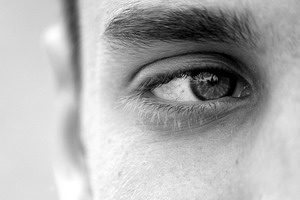 oll around and you would use the Epley maneuver: oll around and you would use the Epley maneuver:
https://www.youtube.com/watch?v=9SLm76jQg3g
With lateral canal issues, your eyes move side to side and the Lempert maneuver is called for:
https://www.youtube.com/watch?v=mwTmM6uF5yA
If your eyes bounce up and down, the superior canal is  the problem. In this case, he deep head hanging maneuver is performed. Deep Head Hanging Maneuver to Treat BPPV Vertigo
This is the latest and greatest info I have found for what you can do at home for vertigo that comes on for no good reason and is triggered by head movement.
In the office, I look for issues with the position of the upper neck vertebra that might be affecting blood flow to the balan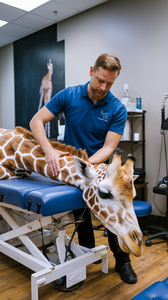 ce areas of the brain. I also check for issues with the proper drainage of lymph fluid around the ear. One side being congested and the other not can create that brain confusion that can produce vertigo. Sometimes issues with the TMJ joint can be involved as well as the muscles of the tongue. Sinus congestion is another obvious concern when vertigo is present. Occasionally, I have to correct the coordination of the eye muscles as they can be sending mismatched signals. In rare cases, I have found issues with the tailbone. What does that have to do with anything? Well, the tailbone acts like the tuning keys on a stringed instrument. It controls the tension in the dural sheath around the spinal canal which controls the flow of cerebral spinal fluid around the spine. If that is not flowing properly then the fluid can back up into the brain stem causing brain stem issues like balance problems. The body is really complex. ce areas of the brain. I also check for issues with the proper drainage of lymph fluid around the ear. One side being congested and the other not can create that brain confusion that can produce vertigo. Sometimes issues with the TMJ joint can be involved as well as the muscles of the tongue. Sinus congestion is another obvious concern when vertigo is present. Occasionally, I have to correct the coordination of the eye muscles as they can be sending mismatched signals. In rare cases, I have found issues with the tailbone. What does that have to do with anything? Well, the tailbone acts like the tuning keys on a stringed instrument. It controls the tension in the dural sheath around the spinal canal which controls the flow of cerebral spinal fluid around the spine. If that is not flowing properly then the fluid can back up into the brain stem causing brain stem issues like balance problems. The body is really complex.
This is my present state-of-the-art protocol for treating vertigo. It is not a simple issue as you can see. Sometimes I see dramatic improvement and other times not so much. However , as I am seeing it so frequently these days, I thought it needed a newsletter to discuss it. , as I am seeing it so frequently these days, I thought it needed a newsletter to discuss it.
Take care,
Hey, that amazing C15 supplement that is for maki ng your cell membranes stronger/less fragile is now available in the office! Pick yours up now! ng your cell membranes stronger/less fragile is now available in the office! Pick yours up now!
Ellen had to go to Sutter Imaging last week as part of a scan her hematologist ordered to try to figure out why she has too many red blood cells. She has been this way forever, but her 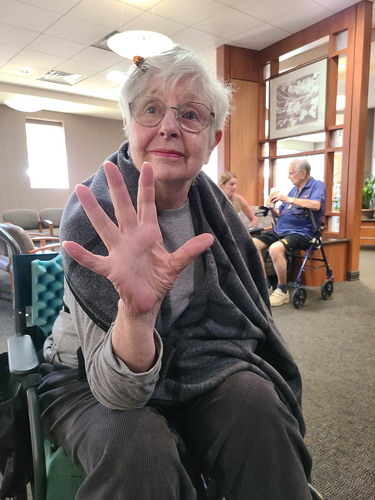 primary decided that now was a good time to figure out why. primary decided that now was a good time to figure out why.
|
 t are where they should be. Everything is just moving around. Closing your eyes may help, but sometimes it only makes things worse. Generally, we call this vertigo. Personally, I would rather have pain than vertigo, but that is just me. This dizziness may cause nausea and it may cause headaches. Many different muscles may even begin to cramp as your body struggles to right its position and regain balance. Vertigo is not much fun.
t are where they should be. Everything is just moving around. Closing your eyes may help, but sometimes it only makes things worse. Generally, we call this vertigo. Personally, I would rather have pain than vertigo, but that is just me. This dizziness may cause nausea and it may cause headaches. Many different muscles may even begin to cramp as your body struggles to right its position and regain balance. Vertigo is not much fun. the problem. In this case, he deep head hanging maneuver is performed.
the problem. In this case, he deep head hanging maneuver is performed.











